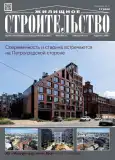The theme of the niche in the houses of the residents of Ani, the largest Christian city in Armenia
- Authors: Kazaryan A.Y.1, Baeva O.V.1
-
Affiliations:
- National Research Moscow State University of Civil Engineering
- Issue: No 11 (2024)
- Pages: 14-20
- Section: Articles
- URL: https://modernonco.orscience.ru/0044-4472/article/view/642805
- DOI: https://doi.org/10.31659/0044-4472-2024-11-14-20
- ID: 642805
Cite item
Abstract
The study of niches in the interiors of medieval dwelling houses of Ani, the largest Christian city in Armenia, carries out for the first time as part of a monographic article. The material for the study is the samples of niches in the structure of the houses of Ani excavated by the expedition of Nikolay Marr more than a century ago and by Turkish archaeologists over the past decades. The typological classification, carried out according to various criteria, contributes to the ordering of this material, which, despite its wide popularity, turned out to be poorly studied. Special attention is paid to the conches of the niches, which often had sculptural and carved decoration. It made the niche the most expressive form in the entire room. The dating of the studied niches within the epoch between the second half of the 12th and the first half of the 14th century is confirmed by the peculiarities of the stylistic implementation of these architectural forms, as well as their visual similarity with the niches created in the apses of Armenian churches, starting from the turn of the 12th–13th centuries. Reflections are expressed on the purpose of niches in the halls of dwelling houses, some palaces, on their similarity to the niches depicted in the miniatures of manuscripts, with the titles of the gospels. The similarity with the niches in the palaces of the Seljuks of Asia Minor also is detected.
Keywords
Full Text
About the authors
A. Y. Kazaryan
National Research Moscow State University of Civil Engineering
Author for correspondence.
Email: armenkazaryan@yahoo.ru
Doctor of Art Study, Academician of RAASN
Russian Federation, 26, Yaroslavskoe Highway, Moscow, 129337O. V. Baeva
National Research Moscow State University of Civil Engineering
Email: olabaeva@mail.ru
Doctor of Art Study, Docent
Russian Federation, 26, Yaroslavskoe Highway, Moscow, 129337References
- Baeva O. Ani: An urban planning idea for the New City and its continuity. Projekt Baikal. 2023. No. 20 (76), pp. 184–189. (In Russian). EDN: MLXMCH. https://doi.org/10.51461/issn.2309-3072/76.2170
- Kazaryan A.Yu. Ani Archaeological Institute. Range of Activity and What Achieving Headway is Based On. Voprosy vseobshchej istorii arhitektury. 2016. No. 2 (7), pp. 9–27. (In Russian). EDN: YPMREQ. https://vvia.elpub.ru/jour/issue/viewIssue/14/7
- Medvedeva M.V. Sixteen Ani Campaigns by Nikolai Marr: the representativeness of photographic documents in the archival collection of IHMC RAS. Actual Problems of Theory and History of Art. 2023. No. 13, pp. 213–228. (In Russian). EDN: ZAPIOO. http:// dx.doi.org/10.18688/aa2313-2-17
- Kazaryan A.Yu. Architecture of Medieval Armenia as a field of research of russian and italian scholars: comparative analyses of the historiography. Arts. Special Issue “Russia: Histories of Mobility”. 2023. No. 12 (6). 238. https://doi.org/10.3390/arts12060238
- Kazarian A.Yu., Kukina D.A., Medvedeva M.V. Records “on the N. Ya. Marr’s mission to Russian Armenia for carrying out archaeological researches there”. The first experience of excavations at Ani. Arkheologicheskie vesti. 2022. No. 37, pp. 214–227. (In Russian). EDN: EHBOOB. https://doi.org/10.31600/1817-6976-2022-37-214-227
- Orbeli I.A. Kratkii putevoditel’ po gorodishchu Ani (Aniiskaya seriya, 4) [A short guide to the settlement of Ani. Series of Ani, 4]. Saint Petersburg: Printing House of the Imperial Academy of Sciences. 1910. 45 p.
- Zeitlian Watenpaugh H. Preserving the medieval city of Ani: cultural heritage between contest and reconciliation. Journal of the Society of Architectural Historians. 2014. Vol. 73. No. 4, pp. 529–555.
- Baeva O.V., Kazaryan A.Yu. Dwellings of the medieval city of Ani. Historiography and research results. Aktual’nye problemy teorii i istorii iskusstva. 2022. No. 12, pp. 123–134. (In Russian). EDN: ZAPIOO. https://doi.org/10.18688/aa2212-01-07
- Marr N.Ya. Ani. Knizhnaya istoriya goroda i raskopki na meste gorodishcha [Ani. Book history of the city and excavations at the site of the settlement]. Moscow; Leningrad: State Socio-economic Publishing House. 1934. 136 p.
- Khalpakhch’yan O.Kh. Grazhdanskoe zodchestvo Armenii (zhilye i obshchestvennye zdaniya) [Civil architecture of Armenia (residential and public buildings)]. Moscow: Publishing House of Literature on construction. 1971. 246 p.
- Tokarskii N.M. Arkhitektura Armenii IV–XIV vv. [Architecture of Armenia of the IV–XIV centuries]. Yerevan: Armgosizdat. 1961. 388 p.
- Arslan M. Kubadabad Saraii’ndaki alchy buluntulary: Ani [The first Seljuk architecture in Anatolia: Ani]. Konya: Palet Yayinlari. 2021. 246 p. (In Turkish).
- Loshkareva E.A. The ornaments and sculptures of the blind arcade of the St. Gregory church (Bakhtagek’s or Khachut’s church) in the context of decoration of the early-13th- century Ani churches. Voprosy vseobshchej istorii arhitektury. 2020. No. 2 (15), pp. 28–43. (In Russian). EDN: RRIKZG. https://doi.org/10.25995/NIITIAG.2020.23.74.002
- Harutyunyan V.M. Ani kaghake [The city of Ani]. Yerevan: Haypetrat. 1964. 96 p.
Supplementary files
















